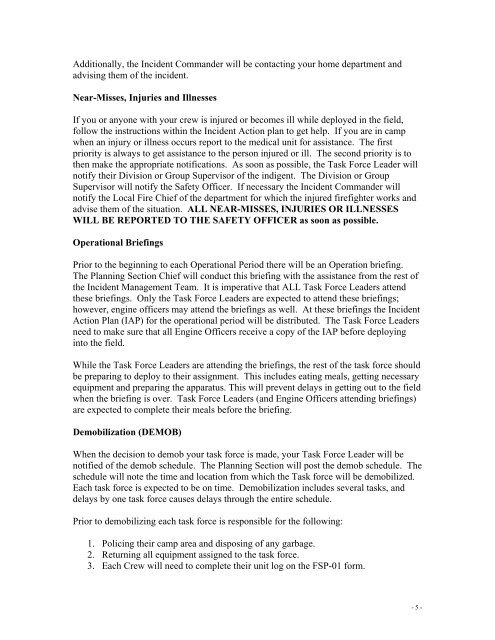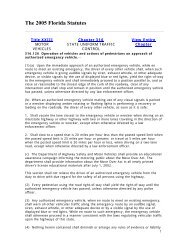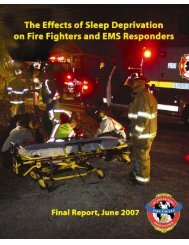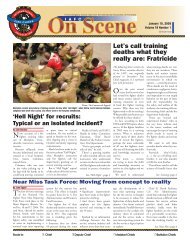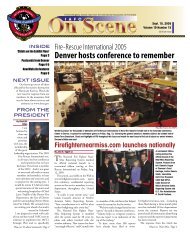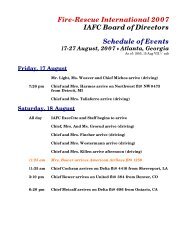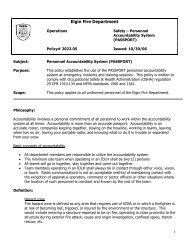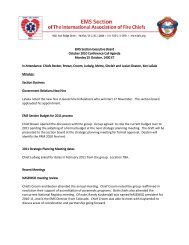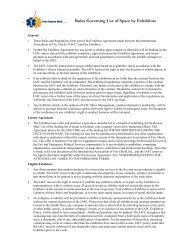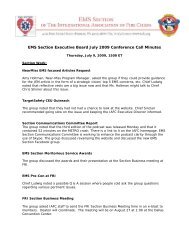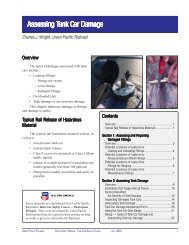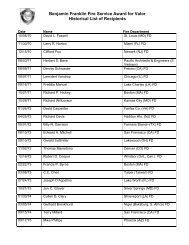oregon fire service mobilization plan - International Association of ...
oregon fire service mobilization plan - International Association of ...
oregon fire service mobilization plan - International Association of ...
Create successful ePaper yourself
Turn your PDF publications into a flip-book with our unique Google optimized e-Paper software.
Additionally, the Incident Commander will be contacting your home department and<br />
advising them <strong>of</strong> the incident.<br />
Near-Misses, Injuries and Illnesses<br />
If you or anyone with your crew is injured or becomes ill while deployed in the field,<br />
follow the instructions within the Incident Action <strong>plan</strong> to get help. If you are in camp<br />
when an injury or illness occurs report to the medical unit for assistance. The first<br />
priority is always to get assistance to the person injured or ill. The second priority is to<br />
then make the appropriate notifications. As soon as possible, the Task Force Leader will<br />
notify their Division or Group Supervisor <strong>of</strong> the indigent. The Division or Group<br />
Supervisor will notify the Safety Officer. If necessary the Incident Commander will<br />
notify the Local Fire Chief <strong>of</strong> the department for which the injured <strong>fire</strong>fighter works and<br />
advise them <strong>of</strong> the situation. ALL NEAR-MISSES, INJURIES OR ILLNESSES<br />
WILL BE REPORTED TO THE SAFETY OFFICER as soon as possible.<br />
Operational Briefings<br />
Prior to the beginning to each Operational Period there will be an Operation briefing.<br />
The Planning Section Chief will conduct this briefing with the assistance from the rest <strong>of</strong><br />
the Incident Management Team. It is imperative that ALL Task Force Leaders attend<br />
these briefings. Only the Task Force Leaders are expected to attend these briefings;<br />
however, engine <strong>of</strong>ficers may attend the briefings as well. At these briefings the Incident<br />
Action Plan (IAP) for the operational period will be distributed. The Task Force Leaders<br />
need to make sure that all Engine Officers receive a copy <strong>of</strong> the IAP before deploying<br />
into the field.<br />
While the Task Force Leaders are attending the briefings, the rest <strong>of</strong> the task force should<br />
be preparing to deploy to their assignment. This includes eating meals, getting necessary<br />
equipment and preparing the apparatus. This will prevent delays in getting out to the field<br />
when the briefing is over. Task Force Leaders (and Engine Officers attending briefings)<br />
are expected to complete their meals before the briefing.<br />
De<strong>mobilization</strong> (DEMOB)<br />
When the decision to demob your task force is made, your Task Force Leader will be<br />
notified <strong>of</strong> the demob schedule. The Planning Section will post the demob schedule. The<br />
schedule will note the time and location from which the Task force will be demobilized.<br />
Each task force is expected to be on time. De<strong>mobilization</strong> includes several tasks, and<br />
delays by one task force causes delays through the entire schedule.<br />
Prior to demobilizing each task force is responsible for the following:<br />
1. Policing their camp area and disposing <strong>of</strong> any garbage.<br />
2. Returning all equipment assigned to the task force.<br />
3. Each Crew will need to complete their unit log on the FSP-01 form.<br />
- 5 -


